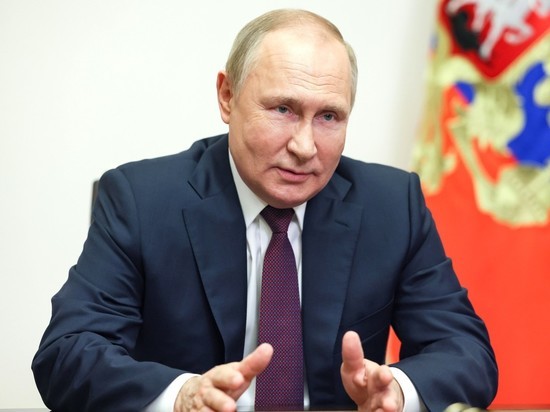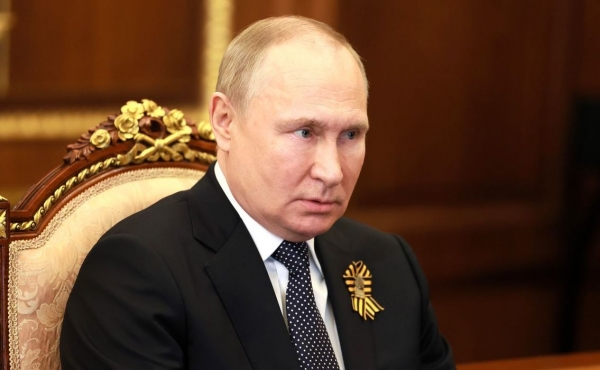They are trying to strangle Russia using “neutrals”
The two news came almost simultaneously. The Wall Street Journal, an organ of American business circles, reported that a rebellion is brewing in the bowels of the Organization of Petroleum Exporting Countries aimed at squeezing Russia out of the de facto states associated with this bloc. Russian Foreign Minister Sergey Lavrov has arrived on a visit to Saudi Arabia, a country that is “both the heart and the fiery engine” of the OPEC bloc. A coincidence? If so, then only from the category of those that seem coincidences only at first glance.

Photo: kremlin.ru
The advent of calendar summer has drawn a line under the West’s attempt to bring down the Russian economy with the help of a rapid onslaught. The onslaught didn’t work. And now the US and the EU are switching to the tactics of a constantly adjusted long-term siege.
One of the key elements of this siege is the seduction and/or intimidation of the so—called neutrals – states that balance between Moscow and the West and try to “skim the cream” from their conflict.
I wanted to fly to the USA, but instead I retired. On April 22 of this year, the Minister of Foreign Affairs of Kyrgyzstan Ruslan Kazakbayev was suddenly relieved of his duties. The official version is the state of health. As the minister informed President Sadyr Zhaparov, he urgently needed a rest for two or three months due to the sharply deteriorated state of the body.
The state of the body of Kazakbayev has really deteriorated — but not physically, but politically. According to informed sources, having received tempting promises from the United States to “help”, official Bishkek started an active political flirtation with Washington. An angry, dissatisfied shout immediately followed from Moscow. And the supreme power of the republic pretended that it had nothing to do with it. This, they say, Kazakbayev is acting on his own.
As a result, instead of flying to the United States to sign a cooperation agreement, the foreign minister went to improve his health. However, this small but revealing story still does not have a clear ending with a clear moral — such as “a well-deserved reward has found its hero.” It is quite difficult to believe that in such an important issue the former minister was self-willed without the knowledge of his superiors. And the fact that the new head of diplomacy of Kyrgyzstan, Jeenbek Kulubayev, is considered even more pro-Western figure than Kazakbayev, is suggestive.
Against the general background of the big game between Russia and the West, the personnel reshuffle in Bishkek is just a trifle, a barely noticeable “statistical error”. But, on the contrary, the principle of “both ours and yours — and, most importantly, yourself”, which is very clearly manifested in the actions of the Kyrgyz authorities, is universal. This principle is now guided by the absolute majority of the former republics of the USSR, and the countries of the Middle East like Saudi Arabia, and the current “best friend of Moscow” Turkey, and even such giants of the world stage as India and China.
The great American filmmaker Stanley Kubrick once said: “Great nations have always acted like bandits, and small countries like prostitutes.” I’ve never liked that saying. And the events of 2022 proved that my doubts about the wisdom of this thought are very well founded. All parties that are not directly involved in the conflict over Ukraine — both “great nations” and “small states” — behave primarily as prudent businessmen.
Take, for example, Beijing’s position. Should I say something angry about “American hegemonism” at the level of the Foreign Ministry? This is please! Buy Russian energy carriers at a big discount as part of the sharply accelerated notorious “turn to the East?” With even more pleasure!
Do something that carries the risks of falling under secondary American sanctions? Yes, not in life! Step aside, Russian citizens! We don’t know you!
With all the offensiveness of this approach for Moscow (I’m not talking about Beijing alone again, but about the whole picture), it is quite natural: in world politics, everyone has their own hut on the edge. In addition, the national selfishness of the “sympathizers and neutrals” in the last three months has generally worked more for the interests of Russia, rather than for the interests of its opponents.
And now the collective West wants to close this gap. As usual, the “friends of Moscow” from Warsaw act as a skirmisher. Prime Minister Mateusz Morawiecki: “Poland and more and more European Union countries are talking loudly about so-called secondary sanctions. Firstly, it is the possibility of imposing sanctions in such a way that Russian oil cannot also be sold to third countries outside the European Union.”
In other words, the EU, following the example of the United States, wants to try itself as a hegemon, ultimatum prohibiting non-member countries from trading with Russia. Very interesting! We are waiting for the continuation — and with a sense of anxiety (what a sin to conceal!), and with burning interest (can this really be done?), and with some anticipation.
The ideal position for “neutrals and sympathizers” is to stay either above the fight or away from the fight as long as possible. Figures like Moravetsky push them out of this convenient place and force them under demonstrative and humiliating pressure to give a clear and nuanced answer to the question in the style of Maxim Gorky’s famous rhetorical exclamation “Who are you with, masters of culture?”
It is extremely curious: how will, say, Xi Jinping react to this? Will he really like the “news” that now the most important Chinese authorities are sitting not in Beijing, but in Warsaw?
I am sure that, understanding the delicacy of the situation and their mutual dependence on the same China, the EU leaders will act more cautiously and carefully. But this does not negate the general trend. The collective West has seriously taken up the processing of neutral “masters of culture”. Let’s see if they have enough political skill to give Westerners a decent (and comfortable for Russia) answer.
“Putin’s disease”: recent photos of the president showed the truth

See the photo gallery on the topic

